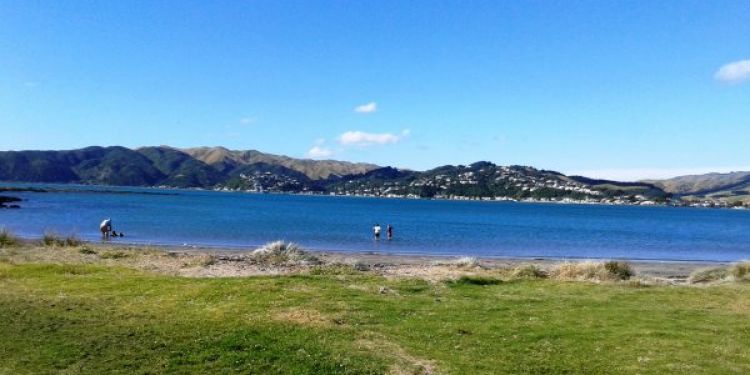Why did you decide to move to New Zealand?
I'd always wanted to live abroad, and when we were looking at possible places, we wanted and English-speaking country that was 'nicer' than the UK. NZ fitted all the criteria.
How was the moving process?
Once we had made the decision to move, the only thought I had was how difficult it was going to be to say goodbye to my family. When we left, it was every bit as difficult as I had imagined. It still is, every time we go home and have to leave.
We had to sell our house and cars, get rid of a lot of stuff and have the rest shipped over.
Back then there was no internet or social media, so finding things out and keeping in touch with family was probably more difficult than it would be now. When we had got through the emigration formalities we came to have a look round NZ. During this time my husband found a job. The organisation employing him put us up in a hotel apartment when we arrived, which gave us time to look round for a house to rent. Unfortunately our furniture arrived a lot later than anticipated and as we had rented an unfurnished house we had to borrow sticks of furniture from people at my husband's work to keep us going until it arrived. You can cope with most challenges when you know they are temporary!
What were the formalities you had to undergo in order to be able to live in New Zealand?

We went through the formal emigration process. Back then we needed a certain number of points (was it 28?) to be accepted. It took us about 3 months to get all the paperwork and medicals sorted.
We wanted to make sure we got it right and so paid a migration service to help us. They got some of it wrong, and had to do some serious remedial work!Did you look for a job in Wellington?
We came for a 2-week reccy before we emigrated and my husband contacted organisations and employment services while we were here, had a few interviews and was offered 3 jobs.
I also looked for work in advance but didn't have a job by the time I came. When I arrived I was given a contact by my husband's boss, and secured a contract after being here 3 weeks.
Did you face some difficulties to adapt to your host country (language, culture, do's and don'ts)?
Not difficulties - it was just a case of adapting to a new way of living. It took a little while to get used to issues such as the accent, words and phrases, Maori culture, place names, a smaller range of foods, seasons being the opposite way round, and so on.
I was a vegetarian and would often find it difficult to find food in sandwich bars and cafes, but it isn't difficult now.
What surprised you the most in Wellington?
How it felt like a change of culture, even though there are a lot of similarities with the UK. Even though it's the capital, the roads in the city are not manically busy and you can sometimes cross the road in the city centre without waiting for the lights to change.
Central heating is not the norm, even though winter can be pretty cold.
Back in 1995 most people had a cell phone, which wasn't the case in the UK.
Is it easy to meet new people in Wellington? Any advice to share with the other members?
We were surprised at how well supported all the events and hobbies were, so if you are prepared to get out and join things, you will meet people - people are very friendly.
Having children is a good way to get to meet other people.
Could you please share with us something you like about Wellington and something you don't like?
I like the fact that although Wellington is the capital city, it is small enough to get around easily; that it isn't overcrowded, and it's possible to live in a leafy suburb that is only a 15 minute train ride away from the city centre.
I also like the fact that people here are much more open to potential when it comes to work and business.
Sometimes I get fed up with the wind. I would sit in the garden more often if it wasn't windy.
A common belief about New Zealand which wasn't right:
Please please please do not say "New Zealand is like Britain in the 1950's". The only people who say that are ones who haven't lived here.
What do you miss the most from England, your home country?
My family and friends.
What does a typical day as an expat in Wellington look like?
Depends on what type of life you choose to create for yourself! You can create any lifestyle you like. From a housing point of view, a free-standing (detached) house on a quarter acre section is pretty normal. Houses are generally bigger than the UK - but not many have central heating!
The pace of life is very pleasant. We live in the northern suburbs. My husband works in the city and gets the train in and out. I'm based from home and either work here to write, or go out to organisations to run workshops. I am involved with a number of groups and voluntary work and will go out to these in the evenings or during the day. I often go to the local swimming pool in the morning before starting work. It's fairly empty and only costs $3.
I go to the supermarket once a week - supermarkets aren't busy where we live, even at 'busy' times, and contain a good range of foods.
My daughter is at college (college is for 13-18 year olds). Each morning a group of friends turn up at our house at 8am and they all walk there together, and back at 3.20pm. My son is a bit older and goes to a technical college; he gets the college bus there and back. As it's a bus specifically for the college and only goes there and back once a day he leaves at 7.10am and gets back at 5.40pm. Both children are involved in activities in the evenings.

What do you do in your spare time? What are the most popular activities?
I volunteer as a support worker for a refugee family via Refugee Services and as a reader/writer at my daughter's college; I also go dancing and to a spiritual development group, as well as doing DIY and craft work.
There are lots of activities available - you can find pretty much anything here, and if you can't, then you just set something up. I've set up a number of things since I've been here.
You lived in several countries: how did your experience abroad impact your life?
I think that moving to other countries affects people differently. I like moving from place to place and would love to move countries often; my son is pretty blasé about it and would be happy anywhere as long as there is internet access (!); my husband is less keen and prefers to have a home base; and my daughter found it very hard to say good bye to friends she had made in different countries. We have now decided to be based in NZ for a while, mainly for my daughter to have stability, and for my husband to have a 'base'.
When you move in the way that we do - namely decide on a country, go there and look for work, rather than moving for work - it can impact on career (depending on your career -this is one of the reasons I'm building a writing career as you can do it anywhere) and finances.
In general I think that people gain a lot of knowledge and expand their comfort zone by moving to other places and experiencing other cultures. It widens views, and reduces prejudices regarding different types of people and different ways of living.
Which advice would you give to people wishing to live in New Zealand?
Compared to living in East Africa and the UK, life in NZ is very easy. It is a lovely country to live in, and pretty much everything you could want is here. If you want a fast-paced London/New York/Paris lifestyle then NZ isn't the place for you, but if you want a pleasant lifestyle with lots of potential then it's definitely worth considering.
Ignore people who tell you NZ is behind the times.
Having seen a number of people emigrate who don't realise that it takes a while to get used to another way of living, who then go home saying "it's too hard", please understand that you will face a period of unrest where things don't feel comfy. Don't give up - the benefits are absolutely worth it.
If you are coming from the UK or Europe - bear in mind it's a long way to go for trips home.

















Contact us to be featured in the Interviews section.
Participate